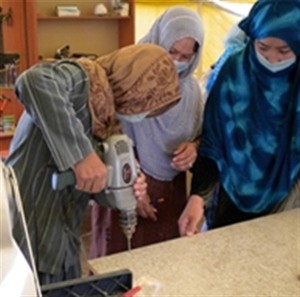
Women learn vocational skills at the Afghan Women’s Initiatives organization through funding and support from USAID.
USAID/ASGP Kabul Staff
Women learn carpentry and vocational skills in Kabul Province
9 NOVEMBER 2010 | KABUL, AFGHANISTAN
Dasht-e-Barchi is a poor community located to the west of Kabul. Although a two-lane road was recently constructed, the streets are almost too narrow for a car to pass, and the dilapidated houses on either side of the road suggest that no one could afford to own a car here anyway. However, there is hope for economic improvement in the community and it resides with a vocational training program for women.
On the street, a small gate opens onto a yard. A worn-out white marquee points the way to women hard at work. Inside, the women are so immersed in their carpentry, that they hardly notice visitors. The only man present is their trainer, trying industriously to keep pace with them.
Shahla, the 19-year-old head of the association, welcomes visitors to her center. Shahla originally learned carpentry skills from Mrs. Fatima, an established local businesswoman, and used her skills to help support her mother – her only remaining family member. She has finished school but has not yet had the chance to study at university.
During a conversation with a capacity development facilitator for the USAID supported Ambassador’s Small Grants Program (ASGP) for Gender Equality in Afghanistan, Shahla decided to apply for one of its grants. The ASGP team helped Shahla prepare her application to establish the Afghan Women’s Initiatives organization, which teaches women valuable job skills. After her grant was approved, Shahla was able to bring together 30 vulnerable women to learn the art of carpentry and how to read. The grant enabled her to buy tools and equipment for the project. Mrs. Fatima helped Shahla find the space for the carpentry and literacy training, and provided her with access to an office.
Most of the participants of this project are widows or have disabled husbands. Some of them walk for nearly an hour to get to the center. They are grateful for the opportunity to gain literacy and vocational skills through Afghan Women’s Initiatives. Soon, the women will be able to supply the local market with cabinets, chairs, tables, and desks. The sale of the furniture produced will improve each woman’s economic situation and raise her standing within her family and community.







Comment
Make a general inquiry or suggest an improvement.